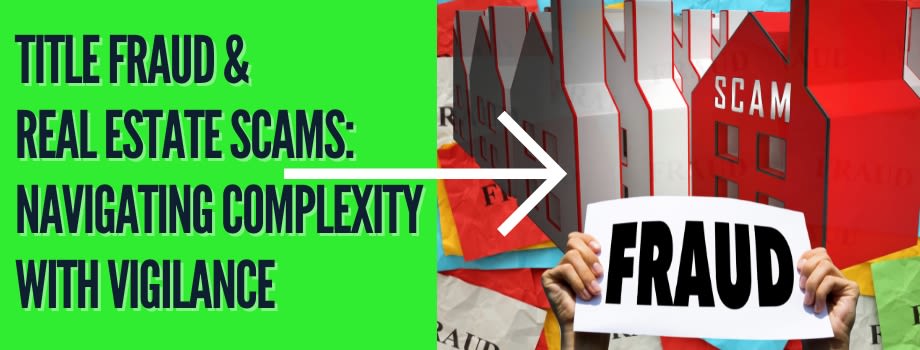
Title Fraud and Real Estate Scams: Navigating Complexity with Vigilance
In the dynamic landscape of real estate, the unsettling saga of William Gordon serves as a stark reminder of the lurking perils posed by title fraud and real estate scams. As a seasoned property owner at 65, Gordon's unexpected encounter with a congratulatory letter from a trusted title company brought to light a prevalent issue within the domain of real estate transactions.
In March 2023, Gordon received a letter that ostensibly celebrated the $200,000 sale of his Tucson property in Arizona. An unusual twist quickly emerged – Gordon hadn't listed his property for sale. What began as a puzzling anomaly gradually uncovered the intricate nuances of title fraud and the broader challenges presented by real estate scams.
Gordon's case, though unique, is emblematic of a larger predicament. Data from the FBI's Internet Crime Complaint Center reveals that real estate scams witnessed a surge in 2022, impacting over 11,000 individuals with a cumulative loss of $350 million. Title theft, a significant facet of this trend, involves fraudulent individuals assuming ownership by exploiting homeowners' identities.
The aftermath of Gordon's discovery led him down a bewildering path. His attempts to rectify the situation shed light on the complexities that victims of such fraud must navigate. Phone calls yielded ambiguity and responsibility issues, reflecting the broader challenges victims face when addressing such incidents.
Beyond Gordon's experience lies a discernible issue in the structure of real estate transactions. The seemingly innocuous congratulatory letter contained discrepancies that, in hindsight, the title company and Gordon should have spotted. A misplaced notary stamp and inaccurate information on the recorded deed underscore the vulnerabilities in the verification process. This reveals a pressing need for stringent safeguards to prevent fraudulent activities.
Central to this predicament is the question of accountability. Gordon's interaction with the Pima County Recorder's Office brought to the fore the blurred lines of responsibility in such cases. The office's role as a document recorder rather than a verifier highlighted a reliance on title companies and notaries for authenticity checks. However, Gordon's experience reflects the shortcomings of this approach, signaling the importance of a comprehensive verification system.
In response, Arizona's real estate professionals have taken steps to address the rising wave of fraud. Industry experts like Eric Gibbs and Jeff Murtaugh have introduced measures to minimize vulnerabilities. Nevertheless, the issue of liability remains a gray area, prompting a collective call for reevaluating industry practices.
Gordon's struggle to reclaim his property underscores the financial and emotional toll such incidents can exact. The return of funds to fraudulent buyers through title insurance left him with a substantial financial burden. His predicament serves as a reminder that enhanced accountability within the realm of title companies and associated entities is crucial.
As the real estate landscape evolves, Gordon's narrative serves as a reminder to remain vigilant against the escalating threat of real estate scams and title fraud. His experience underscores the importance of robust verification processes within real estate law. In a world where substantial financial transactions are commonplace, it's imperative to establish rigorous procedures to safeguard the interests of property owners like William Gordon.
If you suspect you've fallen victim to title fraud or a real estate scam in California, professional guidance is indispensable. Our knowledgeable attorneys are here to provide informed counsel and support in protecting your property and future aspirations. Reach out to us at (855) 219-3333 for a complimentary 30-minute consultation – a crucial step towards securing your real estate endeavors and fortifying your future.
Please call our office to be connected with a member of our intake team, or fill out our intake form by clicking here.